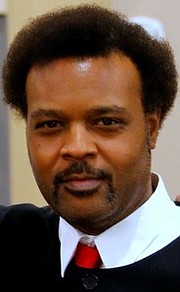During my childhood, Muhammad Ali was the ultimate symbol of blackness, which was a combination of intelligence, socio-political activism and style.
I find it amazing that I'm old enough to remember when black people were amazed and happy to see a black face on television, which meant that they were often nervous about how that person would be portrayed or how that person would present himself or herself. Ali, however, was one of those people who defied and refuted the centuries of lies about African humanity, intellect and morality. He was more than a boxer; yet, he was the greatest boxer of all time.
Think about that. He was the greatest of his profession, a profession that, for years, was the symbol of American manhood, but his presence and essence of manhood transcended it, as he became one of the most powerful acting agents in the Black Liberation Movement. He had the audacity in 1964 to announce to the world that he was smarter and prettier than anyone. At a time when African people were routinely vilified for their physical features and intellectual ability, Ali stood before the world and declared that he was black, beautiful and proud.
Additionally, as a man who was the personification of manliness, he showed the world that manhood was also mental astuteness and empathy for others. Ali, like my father and uncles, affirmed that manhood was not about physically dominating others, but that manhood was about caring for and protecting those who cannot protect themselves. As such, he was powerful because he taught us how to fight for others while we are fighting for ourselves.
Finally, Ali taught me about humility and diligence. For those who don't know the story, Ali was stripped of his title after he refused to be inducted into the armed forces. He spent the next three years lobbying for his right to box.
All the while, he proclaimed, rightfully so, that boxing did not have a real champion because he didn't lose his title in the ring. When Frazier became the champ, Ali made sure that the world considered Frazier a "fake champ." Some, mostly the African American community, agreed, while many, mostly the white community, disagreed. Continuing to fight for his legal right while proclaiming Frazier to be a fraudulent champ, Ali was finally able to fight again.
Then, after all that fighting and talking outside the ring, Ali lost to Frazier. Much of black America was devastated. Noted television journalist Bryant Gumbel stated that he cried his eyes out when Ali lost to Frazier.
Gumbel added, "When Ali lost, it was like those of us fighting for black rights had lost." That's one hell of a weight for one man to carry.
As a child, I wondered, "How could he go before all those reporters and give an interview after losing?" As we said in the country, I would have been too "shame-faced" losing after having talked all that noise. Yet, Ali, like a man, stood before America and the world and answered every question.
Watching footage of that interview, I was amazed that he could remain so poised and confident after suffering the greatest defeat of his career. When I asked my father how Ali could sit there and talk to those people who were happy that he had lost, my father stated, "because he's a man, son—a man like your granddaddy and a man like your uncles."
My father paused, and then continued, "Real men, son, don't run from anything. We do the best that we can, we accept and admit our failures and mistakes, and we work to do better. That's all a man can do."
That's the ultimate lesson that Ali taught me. Stand for that in which I believe, fight as diligently as I can for it, accept and admit my mistakes, and make it my life's journey to learn from my mistakes and failures so that I can become better today than I was yesterday. "Float like a butterfly, sting like a bee: The hands can't hit what the eyes can't see." That famous Ali rhyme inspired me never to stop moving and progressing no matter how much life tried to knock me out. R.I.P. to The Greatest of All Time.
C. Liegh McInnis is the author of seven books, the former editor of Black Magnolias Literary Journal and an instructor of English at Jackson State University.



Comments
Use the comment form below to begin a discussion about this content.
comments powered by Disqus